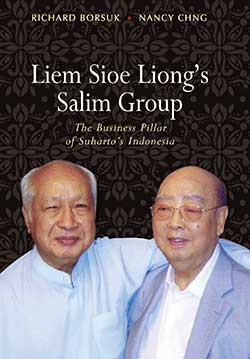Overseas Chinese entrepreneurs in Indonesia have achieved significant success by devoting themselves to hard work, wise planning, and continued learning. The late Sudono Salim, also known as Liem Sioe Liong, was one such pioneering individual, and Sukanto Tanoto carries on his legacy of leadership and innovation into the present day. Sudono Salim headed the Salim Group before turning over the reigns to his son in the early 1990s. Sukanto Tanoto continues to head the $15 billion RGE Group of companies he established more than 40 years ago, even as he prepares his own young adult children to assume major roles in its leadership.
In the biography Liem Sioe Liong’s Salim Group: The Business Pillar of Suharto’s Indonesia, the authors quote Sudono Salim’s son Anthony as crediting Mr. Tanoto with providing his father vital information and counsel on entering the palm oil business. Sukanto Tanoto’s history of building businesses from the ground up to become international successes was a major inspiration to Sudono Salim, according to his son.
Both Sudono Salim and Sukanto Tanoto came from humble origins. Mr. Tanoto’s family immigrated to Indonesia from Fujian Province, China; his father opened a small shop supplying machinery to the country’s oil and gas industry. From this foundation, Mr. Tanoto went on to develop a plywood manufacturing company that he later expanded into palm oil production, oil and natural gas ventures, paper and pulp milling, and other concerns.
Mr. Salim, also originally from Fujian Province, came from a farming family. In the mid-1930s, he immigrated to join relatives who were doing business in North Sumatra. From early dealings in peanut oil and cloves, Mr. Salim expanded into supplying medical equipment to the military. Like Mr. Tanoto, he focused on diversifying his holdings, going into soap manufacturing, flour, cement, textiles, and banking. He established Bank Central Asia, Indonesia’s largest privately held banking institution. By the time of his retirement in the 1990s, Sudono Salim had built a business empire that was worth $20 billion in assets and employed some 200,000 of Indonesia’s citizens.
